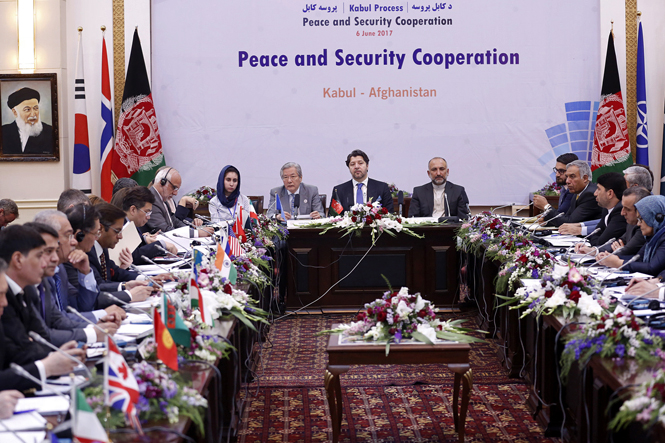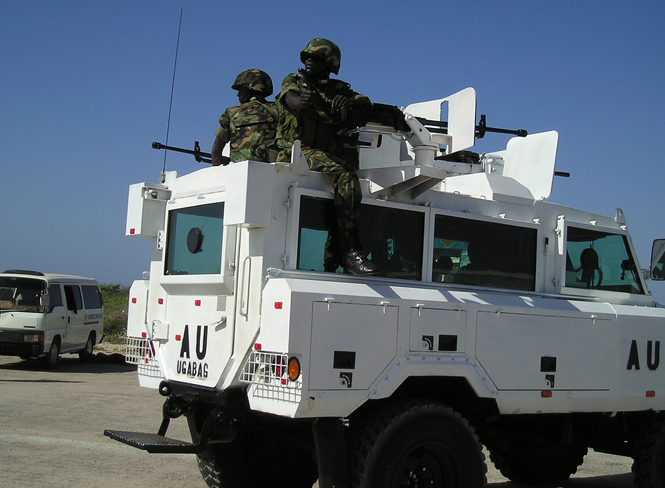Women’s stories we’re missing as coverage of Trump dominates media
With Trump dominating nearly every bit of news across the country and in many parts of the world, reports of major human rights violations against women are being overshadowed. Globally, women and girls are suffering—whether in Bangladesh, where young girls are forced into marriage, or in Burma, where rape is being used as a tool of ethnic cleansing, or in the United States, where cases of female genital mutilation are being uncovered.
Below are some stories greatly affecting women’s lives that you may have missed since Trump came into office.
Afghanistan

Only two Afghan women were at this June meeting meant to forward peace negotiations. (UNAMA/Fardin Waezi)
Violence in Kabul has been on the rise in the past few weeks, despite the beginning of the Kabul Process, the latest effort in peace talks. Yet, as Human Rights Watch noted in early June, there is an inherent flaw in these talks: the lack of women involved. Of the 47 Afghan and foreign participants in a June meeting, only two were Afghan women. And while there has long been a plan to ensure that Afghan women have equal participation in peace negotiations, it has been repeatedly delayed.
Equal representation matters when it comes to bringing peace, research shows. Full participation by women in negotiations “increases the chances of a deal being reached and it being successful,” writes HRW.
Philippines

Philippine President Rodrigo Duterte has a nasty habit of making rape jokes. (Presidential Communications Operations Office)
“If you had raped three, I will admit it, that’s on me,” said Rodrigo Duterte, president of the Philippines, in late May. The gist of this contorted rape joke was that Duterte would proudly take responsibility for such a thing. Duterte made the comment while speaking to soldiers on Mindanao island, where he had just declared martial law, according to a report by the Thomson Reuters Foundation.
As unbelievable as it is for a president to make such a joke, he’s done it before. A video surfaced on YouTubelast year that showed Duterte, who was mayor of the city of Davao at the time, discussing a 1989 prison riot in the city in which an Australian missionary was raped. “I was mad she was raped, but she was so beautiful,” he said in the video, which has since been taken down. “I thought, the mayor should have been first.”
It is statements like these from so-called leaders that embolden perpetrators of sexualized violence and foster a culture of impunity, thus putting girls and women at higher risk.
Burma

Burma’s Rohingya Muslim population is one of the most persecuted groups in the world. Here, a Rohingya woman in a Bangladeshi refugee camp. (Ruben Flamarique/Austcare)
In February, the UN Office of the High Commissioner of Human Rights published a report that found “devastating cruelty” being perpetrated against Rohingya men, women, and children.
OHCHR spoke to more than 200 people who reported witnessing murder, including of young children. Victims as young as 11 were gang raped and left with severe injuries and significant blood loss. Of the 101 women OHCHR interviewed, half of them reported being raped or being subjected to other forms of sexualized violence.
The Rohingya Muslim population is one of the most persecuted groups in the world. For years, Burma’s security forces have committed mass rapes and sexualized violence against the population. The Burmese government has long denied these crimes committed by its military, and it has insisted that recent persecution is a necessary counterinsurgency measure following alleged attacks by Rohingya militants on police border posts late last year.
Poland

A new bill in Poland would seriously restrict women’s access to the morning-after pill. (Iga Lubczańska)
The Polish government has introduced a bill to limit emergency contraception sales, according to a Newsweek article published in late May. While emergency contraception is now available to anyone older than 15 over the counter, the new measure would limit reproductive choice, advocates say.
The bill would force women to seek “medical advice” before taking the pill, which the World Health Organization has already deemed safe—despite Poland’s health minister insisting otherwise.
Emergency contraception, including the morning-after pill, is most effective when taken as soon as possible after intercourse. If women are delayed in purchasing the pill, they are at risk of becoming pregnant and may attempt to access unsafe abortions. Among EU countries, Poland’s abortion law is considered one of the strictest, according to Human Rights Watch.
The bill has passed through both houses of parliament and is now waiting to be signed by President Andrzej Duda.
Uganda

Ugandan peacekeepers seen here in Mogadishu, Somalia. (Abdurrahman Warsameh/International Relations and Security Network)
At least two Ugandan soldiers accused of rape between 2015 and 2017 in the Central African Republic will face court martial, according to a June 6 article in The Guardian. A few weeks before the article appeared, Human Rights Watch published a report that found Ugandan soldiers had sexually exploited or raped at least 13 girls and women since 2015 in CAR. Two women and one girl said soldiers had threatened them into not reporting the abuse, which included forcing women to trade sex for food. The Uganda People’s Defense Force has said that “proper investigations are being conducted.”
“If there are some bad apples among ourselves, we will handle them according to our laws,” a military spokesman said in mid-May.
Still, these investigations don’t typically result in convictions. The UN has been sending peacekeepers who commit crimes back to their home countries in order to be held accountable, but most of these countries—including Uganda—often do nothing when it comes to justice.
United States

On June 20, Governor Andrew Cuomo signed a bill into law that bans the marriage of children under the age of 17. (Azi Paybarah)
Believe it or not, child marriage only became illegal in the state of New York one day ago.
On June 20, Governor Andrew Cuomo signed a bill into law that bans the marriage of children under the age of 17. New York joins Virginia and Texas as the only states that now explicitly prohibit child marriage, according to the nonprofit women’s rights organization Tahirih. “This is a major step in our efforts to protect children and prevent forced marriages,” Cuomo said.
Between 2001 and 2010, around 3,850 children were married in New York State before they reached 18 years of age, according to a Human Rights Watch report. A vast majority of them were girls marrying adult men.
Twenty-seven U.S. states still do not have a minimum age for marriage, Fraidy Reiss of the nonprofit organization Unchained At Last told NPR. This puts young girls in much of the country at further risk of sexualized violence than they already are.
More articles by Category: Girls, Media, Violence against women
More articles by Tag: Rape, Sexualized violence



























